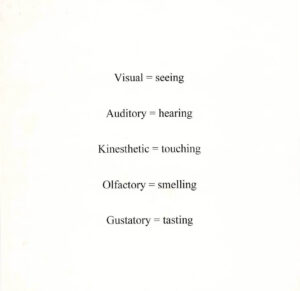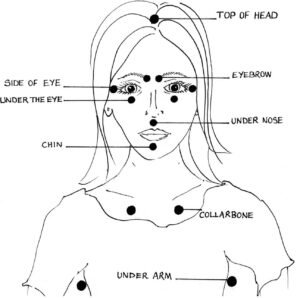
Contrary to what you may have seen on television shows or in the movies, hypnosis is not a mysterious state,...
We all know that good communication makes for better relationships. We also know that good communication can help relationships that aren’t doing well to improve. This truth isn’t limited only to romantic relationships. Communication affects relationships with co-workers, friends, family, neighbors, even people with whom we interact but don’t really get to know. But, how does a person go about achieving good communication in order to get the most out of relationships? Keep reading to learn.
“You can subconsciously get their attention by being in their groove, so to speak, and then you can bring them to yours, to where you want the person to be.”
Learning to communicate in the most helpful manner can certainly be learned. While it may take some observation and readjustment initially, persistent practice is the key to becoming so good at it that you feel satisfied in your various relationships the majority, if not all, of the time. Having satisfying relationships can lead to better health, mentally and physically. It stimulates your brain and causes your central nervous system to release feel-good hormones, like serotonin and endorphins.
Dr. John Kappas, a Marriage and Family Therapist, Hypnotherapist, and founder of the Hypnosis Motivation Institute, published a model of communication several decades ago, and it’s still quite relevant and useful today. As a therapist, he noticed that sometimes he’d use a technique which worked effectively with some patients, but was ineffective with others. He set out to discover what the difference was, and he came to realize it had to do with how we take in and put out information.
It’s enormously helpful to know this model because it assists us in understanding how we react to others, how others respond to us, and how we can use this information to approach people in the most effective way, so we create the most harmonious relationships. Communication and relationships are intimately connected; and that truth stands for any relationship.
His model states that some people are literal. If you say to a literal person, “Today is Tuesday,” on a Tuesday, you’re likely to receive that person’s agreement. Others, Dr. Kappas proposes, are analytical. If you make the same statement to an analytical person on a Tuesday, you’re more likely to be asked why you’re telling that person what day it is. Unlike the literal person who simply accepts and agrees with your statement, the second person is more likely to want to analyze it in order to discern the reason you spoke it.
One way to determine if a person is literal or analytical is to ask yes-or-no questions. If the person usually responds with a yes or no, that person is likely literal. If the person tends to offer an explanation, the person is more likely analytical. When using this method to determine whether the person is literal or analytical, it’s best to base your determination on several yes-or-no questions, not just on one. Also, it’s important to note that we all have the capacity to be either or both literal and inferential. Some of us will respond differently in different situations and/or with different people. Some people change over time. Still others may be between the two.
Good communication allows for each person in a relationship to feel heard and understood. Poor communication creates barriers in relationships. When you’re dealing with communication skills in relationships between couples, you especially want to understand each other’s wants and needs in order to have the smoothest, most satisfying relationship. Good-flowing communication creates healthy boundaries in relationships. Even doctors suggest that having healthy relationships is as important for our health and well-being as diet and exercise.
Let’s say you’re working on communication in a dating relationships. Perhaps it’s with someone you haven’t been dating for very long, and you want to ensure that it goes smoothly. Maybe you’re hoping it will be one that results in marriage. The aforementioned technique of determining how the person you’re dating takes in and puts out information and adjusting how you speak and listen to that person is quite effective. There are also several other options.
With any relationship, it helps to notice how the other person speaks in terms of their senses, then adjust how you respond, so you match their phrasing. We all tend to lean more toward one of our senses, and, again, we’re not all the same. Some, like me, are very visual, others tend to deal more in sound, and still others are more oriented toward touching and feeling. The predominant sense usually affects the phrases a person uses.
For example, if a person were to say, “Look, I see what you’re saying, but what I’m picturing is something a little different,” that person is likely more visually-oriented. If a person says, “Listen, I hear you, but this sounds to me like it just won’t work,” then the person is more likely auditory. If you hear, “I feel you, and I’m really touched by what you did, but I’ll have to connect with you another time,” you’re probably dealing with a kinesthetic person. Matching your phrasing to theirs can be very valuable in building rapport and creating smoother, easier relationships. You might respond with, “All right, let’s see what your vision is,” to the first person; “Let’s hear what you think will work,” to the second; and, “All right, please keep in touch,” to the third.
While we’re on the subject of matching, there’s another technique known as matching and mirroring, which comes from the brilliant minds behind Neuro Linguistic Programming. Based on the theory that we like what is like us, note how the person in your relationship is physically situated, and you do the same. You can subconsciously get their attention by being in their groove, so to speak, and then you can bring them to yours, to where you want the person to be. If the person is leaning back, you lean back. If they’re speaking slowly, slow down the way you speak. Of course, if you perceive that the person’s energy or state is something negative, don’t get into that state emotionally.
When the person feels rapport with you, because you’re like that person, you can use the matching and mirroring to get the person to where you are emotionally. You can alter that person’s physiology. When you change someone’s physiology, you change the person’s state. You don’t want to get so involved in matching and mirroring that you don’t pay attention to the reason you’re interacting with that person, but if you happen to notice that a person is standing, you stand. If the person is sitting or leaning, you do the same.
If people talk with their hands, gesture with yours. If the person has a higher or deeper voice, you might adjust yours a bit to match. You don’t want to do it so much that the other person becomes aware you’re doing it. Be subtle. If someone breaks rapport with you, do what that person does, which may seem like you’re breaking it, but it actually maintains it. Others won’t be aware of what you’re doing, but they’ll feel they relate better to you than if you don’t match and mirror.
Another way to create a better relationship is to help your partner with goal-setting. Often, when you ask someone what he wants, the person will tell you what he doesn’t want. We tend to view the world in more negative terms, because when our earliest ancestors first appeared on the planet, they were very vulnerable. They had no protection, no shelter, no weapons, and they walked the land with beasts who thought they looked quite tasty. They had to be on a relentless vigil for threats to their lives. Fortunately, today we are far less vulnerable, but the tendency to seek out the negative is still with us.
Something to keep in mind is that the subconscious mind may not process negatives qualifiers. If something triggered a panic attack for you in the past, and you fear experiencing another, you may be tempted to tell yourself, “I will not have a panic attack.” Unfortunately, if you word it that way, your subconscious may hear, “I will have a panic attack.” That makes it more likely you will experience one. Also, the original phrasing is focused on the panic attack, not the improvement.
When you have a negative expectation like that, ask yourself what it will be like when the negative is gone, and express yourself in positive terms. Instead of “I will not have a panic attack,” use, “I will remain calm and relaxed,” or “I am really good at this,” or “I’ve done this successfully in the past, I can do it again now.” Use phrasing that includes the positive goal. Helping someone in your relationship to do this makes your relationship better.
Learning to communicate may well make you happier. When we feel we’re not being heard and understood in our relationships, it’s frustrating and depressing. It’s certainly unsatisfying. Making certain adjustments to lead to better communication can not only lead to improved relationships and a happier you, it can also be quite an interesting learning experience.
Please do book a session with me. There’s no need to suffer any longer. I’d love to help you get to where you want to be with your relationship! Book a discovery call and/or session through RelieveYourMind.com.
Frances O’Brien


Contrary to what you may have seen on television shows or in the movies, hypnosis is not a mysterious state,...

Have you ever noticed that when you’re feeling the most stressed, often you want to eat more? Worse, you crave...

Are you looking for a non-invasive and drug free way to relieve stress? Sensate uses sound and vibration designed to...

Back in grade school, we were taught the five senses. It turns out that many of us tend to lean...

You've read about meditation, diet and nutrition, and perhaps you'd like to have a way to enhance that. Using meditation...

There are many ways to make use of essential oils, and aromatherapy is one of them. The most important thing...

What sleep disorders, stress, and the fear of public speaking have in common is they're all problems that can be...

We all experience moments of calmness and moments of stress in our lives. Some of the events of the last...

When you're experiencing stress, it's quite likely that your shoulder and neck area will become stiffer and more rigid. The...
Special Offer
Get Your Consultation For Free Today
Your consultation is free of charge. Let's improve your life together.
Services
Group Sessions
Handwriting Analysis
Office
Currently only seeing clients online via Zoom or via phone
Mon - Thurs: 9 a.m. - 5 p.m.
Fri: 9 a.m. - 4 p.m.
Sat - Sun: hours arrangeable
24-hour notice required to schedule, cancel or change an appointment (Sunday not included)
Contact
© 2025 Relieve Your Mind | All Rights Reserved | Powered by X Times More